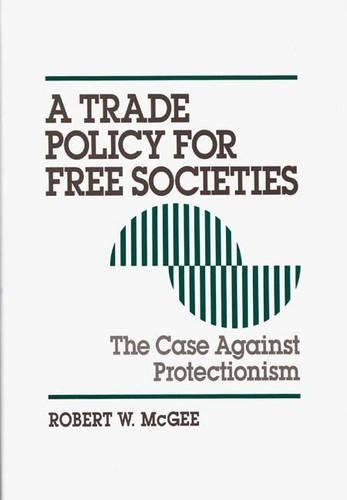
A Trade Policy for Free Societies: The Case Against Protectionism
(Hardback)
Publishing Details
A Trade Policy for Free Societies: The Case Against Protectionism
By (Author) Robert McGee
Bloomsbury Publishing PLC
Praeger Publishers Inc
16th August 1994
United States
Classifications
Tertiary Education
Non Fiction
Economic theory and philosophy
382.71
Physical Properties
Hardback
216
Description
McGee takes the position that the only proper trade policy is one of total, immediate, and unilateral free trade, since such a policy is the only one that is consistent with individual rights. He also explodes the myth that trade deficits are bad and advocates the repeal of the antidumping laws, incorporating rights theory as well as utilitarian arguments. This book is unique in that it (1) does not limit itself to utilitarian arguments, (2) explains why trade deficits are irrelevant, and (3) calls for immediate repeal of the antidumping laws. Part I discusses the philosophy of protectionism and reviews nearly two dozen arguments that projectionists have used to restrict trade. A whole chapter is devoted to exploding the myth that trade deficits are bad. Part II elaborates on the monetary and nonmonetary costs of protectionism. Part III addresses the philosophy and practice of antidumping policy in the United States, and shows why the policy is irrational, destructive and anti-consumer, and concludes that repeal rather than reform is called for. Part IV discusses other issues, such as the policy options for Europe, the effect of competition on prices and efficiency, the stages of economic development and their connection to trade policy, and the irrationality of the United States trade policy toward Eastern Europe.
Reviews
McGee makes an eloquent argument for free trade and against the forces of protection, taking the extreme position that only completely free trade sends correct market signals that promise to maximize global welfare.-Choice
This book is intended to educate government officials and the general public about the costs and consequences of protectionism and the implications these policies hold for individual rights. The book contains a wealth of case studies and empirical examples suitable for use in the classroom. Students of international economics, the educated public, and government officials have much to gain from the background information and policy-oriented discussions contained in this well-written book.-The International Trade Journal
"McGee makes an eloquent argument for free trade and against the forces of protection, taking the extreme position that only completely free trade sends correct market signals that promise to maximize global welfare."-Choice
"This book is intended to educate government officials and the general public about the costs and consequences of protectionism and the implications these policies hold for individual rights. The book contains a wealth of case studies and empirical examples suitable for use in the classroom. Students of international economics, the educated public, and government officials have much to gain from the background information and policy-oriented discussions contained in this well-written book."-The International Trade Journal
Author Bio
ROBERT W. McGEE is a Professor in the W. Paul Stillman School of Business at Seton Hall University. He is the author/editor of more than 30 books and monographs and has written many articles and reviews for a variety of professional and scholarly journals. Among his recent books is Business Ethics & Common Sense (Quorum, 1992).
